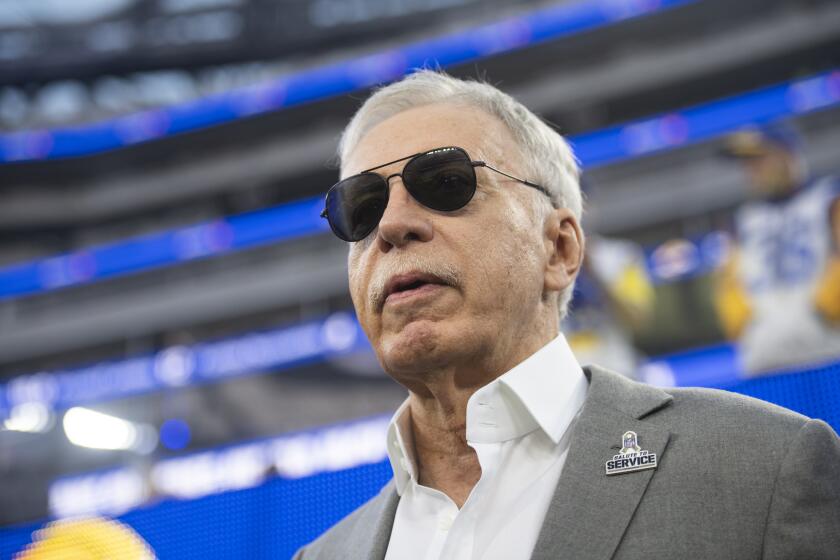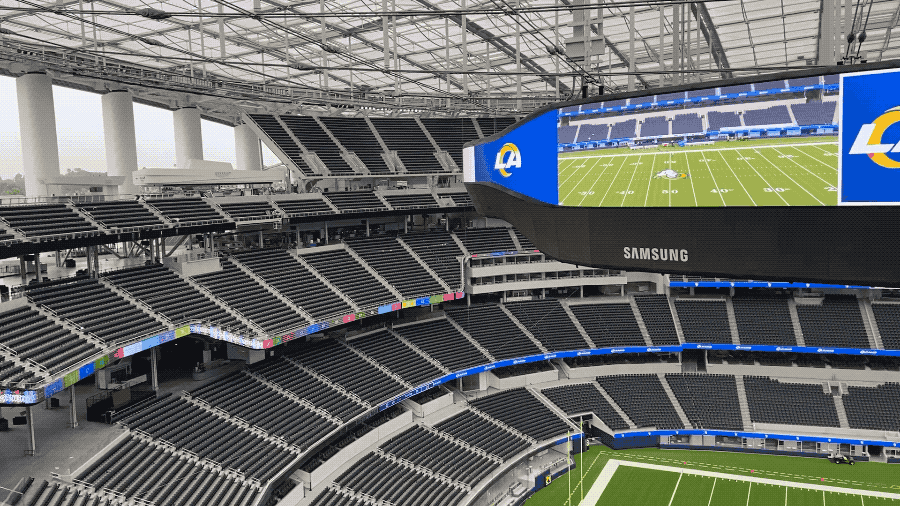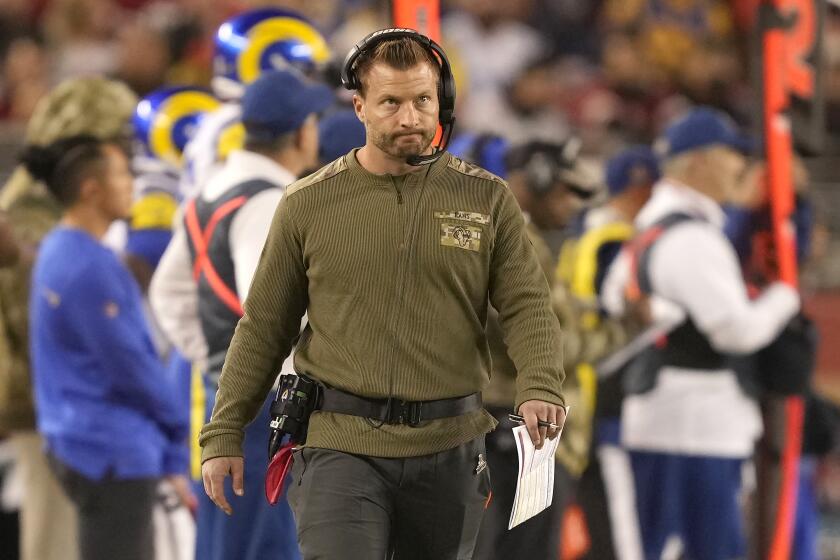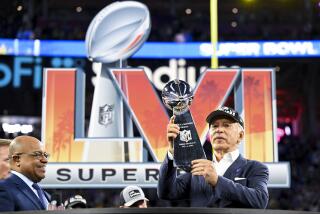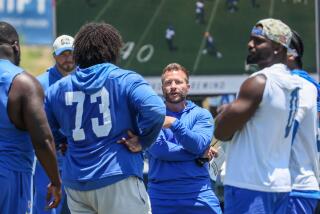NFL and Rams agree to $790-million settlement with St. Louis over relocation
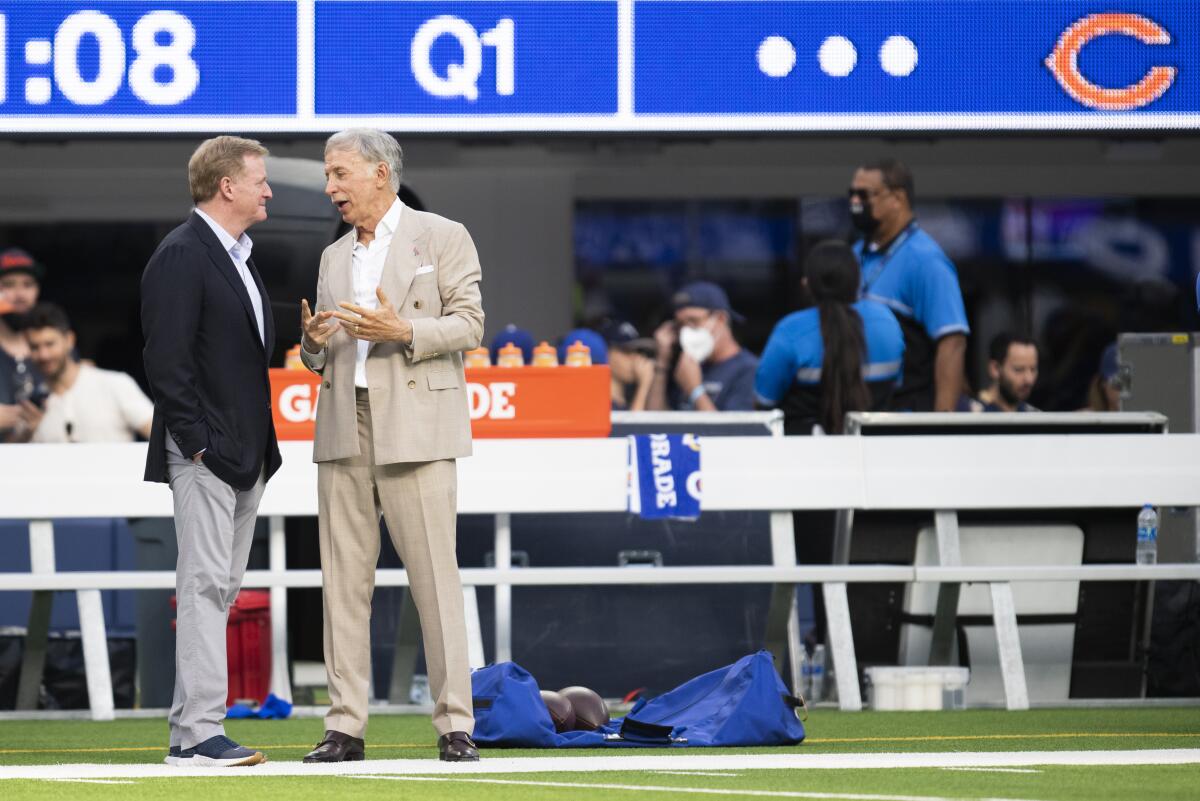
The Rams and the NFL agreed Wednesday to pay $790 million to settle a lawsuit over the team’s departure from St. Louis, enabling Rams owner Stan Kroenke and the league to avoid the spectacle of a St. Louis trial next month, just before the Super Bowl at Kroenke’s showcase stadium in Inglewood.
Under the terms of the settlement, St. Louis gets the money no later than Christmas Eve, with Kroenke and the league left to decide how much of the payment should be allocated to the Rams and how much to the NFL and other owners.
The lawsuit, filed in 2017, alleged that the Rams’ move from St. Louis to Los Angeles violated the NFL’s relocation policy, under which the team and the league should have made every reasonable effort to keep the team in St. Louis. The settlement specifically says no party acknowledges any liability, a critical need for the NFL since Oakland has sued the league on similar grounds over the Raiders’ departure. Oakland lost, but an appeal is pending.
The Rams made no immediate comment Wednesday. The league said in a statement it appreciated “the effort by all parties to reach a settlement.”
In a joint statement, the mayor of the city of St. Louis and the executive of the county of St. Louis said the settlement “closes a long chapter for our region, securing hundreds of millions of dollars for our communities while avoiding the uncertainty of the trial and appellate process.” They said they were “still determining” what to do with the money.
A favorable judge and a nebulous NFL relocation policy is helping St. Louis beat Stan Kroenke and fellow owners in court over the Rams’ move to L.A.
The settlement does not include an expansion team for St. Louis. The settlement provides that 35% of the payment — $276.5 million — be awarded to the attorneys representing St. Louis.
The Rams argued that when St. Louis declined to make $700 million in improvements to the team’s stadium there, a lease provision was triggered that enabled the team to end the lease and leave town.
St. Louis argued that while the provision ended the lease, it did not absolve the Rams from negotiating with the city thereafter. The city said it had spent millions on proposals for a new stadium, secured a naming-rights sponsor and pursued hundreds of millions in public funding while the Rams already had decided to leave for L.A., even as team and league officials stated otherwise.
The NFL asked the St. Louis Circuit Court to throw out the lawsuit, to order private arbitration and to move any trial out of St. Louis. The court declined all three requests; the rulings were sustained on appeal.
The NFL appeared resigned to losing before a hometown jury but was confident it could be successful on appeal, at least in having the damages significantly reduced. St. Louis had sought damages in the range of $4 billion, including payment equivalent to the relocation fee the NFL assessed the Rams and the increase in franchise value resulting from the move to Los Angeles.
The settlement closes the case for St. Louis, but not for the NFL. Before NFL owners approved the Rams’ move, Kroenke signed an indemnification agreement that obligated him to pay the “costs, including legal fees and other litigation expenses,” to defend any challenge to a move.
SoFi Stadium, the NFL’s crown jewel, was the the culmination of Rams owner Stan Kroenke’s vision and the NFL’s desire to return to the L.A. market.
Kroenke has informed fellow owners he does not believe the legal “costs” covered under the indemnity extend to damages, and he had asked them to share in the cost of a settlement. NFL commissioner Roger Goodell has the final say over who pays what under the indemnification agreement, but Kroenke could sue in the absence of what he considers a reasonable deal.
That scenario means that even the settlement might not keep the NFL out of court over the St. Louis deal, with Kroenke opposing fellow owners instead of St. Louis. That prospect comes at an uncomfortable time for the NFL, which is challenging a House Oversight Committee request for documents related to its investigation into the Washington Football Team.
The NFL has declined to release the results of its investigation, intended to explore what two Congresswomen called “widespread abusive workplace conduct” with the team. Former Raiders coach Jon Gruden has sued the league, alleging his firing resulted from the league leaking emails it had obtained through that investigation.
Rams coach Sean McVay said he spent the off week reflecting on a loss to the 49ers and resisting the urge to make overarching changes.
In the Southland, meanwhile, the total cost of bringing back the Super Bowl for the first time since 1993 has topped $6 billion.
It cost $5 billion for Kroenke to build Sofi Stadium; $550 million paid by Kroenke as a relocation fee and $790 million for the Rams and the NFL to settle the St. Louis lawsuit.
How much of that $6.34 billion ultimately will be paid by Kroenke is uncertain. He and the NFL have yet to agree how to divide the $790-million settlement. In terms of the stadium, according to their relocation application to the NFL, the Rams said Kroenke would “invest over $800 million in equity in the project and has the ability to service the debt on the facility.”
How much of that $6.34 billion will be paid by Los Angeles taxpayers is certain: $0.
More to Read
Go beyond the scoreboard
Get the latest on L.A.'s teams in the daily Sports Report newsletter.
You may occasionally receive promotional content from the Los Angeles Times.

